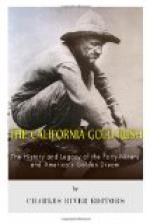The Mexican laws were, in lack of any others, supposed to be enforced. Under this system all trials, except of course those having to do with military affairs, took place before officials called alcades, who acknowledged no higher authority than the Governor himself, and enforced the laws as autocrats. The new military Governors took over the old system bodily and appointed new alcaldes where it seemed necessary. The new alcaldes neither knew nor cared anything about the old Mexican law and its provisions. This disregard cannot be wondered at, for even a cursory examination of the legal forms convinces one that they were meant more for the enormous leisure of the old times than for the necessities of the new. In the place of Mexican law each alcalde attempted to substitute his own sense of justice and what recollection of common-law principles he might be able to summon. These common-law principles were not technical in the modern sense of the word, nor were there any printed or written statutes containing them. In this case they were simply what could be recalled by non-technical men of the way in which business had been conducted and disputes had been arranged back in their old homes. But their main reliance was on their individual sense of justice. As Hittell points out, even well-read lawyers who happened to be made alcaldes soon came to pay little attention to technicalities and to seek the merit of cases without regard to rules or forms. All the administration of the law was in the hands of these alcaldes. Mason, who once made the experiment of appointing a special court at Sutter’s Fort to try a man known as Growling Smith for the murder of Indians, afterwards declared that he would not do it again except in the most extraordinary emergency, as the precedent was bad.
As may well be imagined, this uniquely individualistic view of the law made interesting legal history. Many of the incumbents were of the rough diamond type. Stories innumerable are related of them. They had little regard for the external dignity of the court, but they strongly insisted on its discipline. Many of them sat with their feet on the desk, chewing tobacco, and whittling a stick. During a trial one of the counsel referred to his opponent as an “oscillating Tarquin.” The judge roared out “A what?”
“An oscillating Tarquin, your honor.”
The judge’s chair came down with a thump.
“If this honorable court knows herself, and she thinks she do, that remark is an insult to this honorable court, and you are fined two ounces.”
Expostulation was cut short.
“Silence, sir! This honorable court won’t tolerate cussings and she never goes back on her decisions!”
And she didn’t!
Nevertheless a sort of rough justice was generally accomplished. These men felt a responsibility. In addition they possessed a grim commonsense earned by actual experience.




